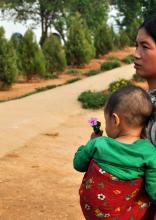Access Denied: Land Rights and Ethnic Conflict in Burma
By Transnational Institute and Burma Centrum Nederland • May 17, 2013 The reform process in Burma/Myanmar1 by the quasi-civilian government of President Thein Sein has raised hopes that a long overdue solution can be found to more than 60 years of devastating civil war. Burma’s ethnic minority groups have long felt marginalized and discriminated against, resulting in a large number of ethnic armed opposition groups fighting the central government – dominated by the ethnic Burman majority – for ethnic rights and autonomy. The fighting has taken place mostly in Burma’s borderlands, where ethnic minorities are most concentrated.
The reform process in Burma/Myanmar1 by the quasi-civilian government of President Thein Sein has raised hopes that a long overdue solution can be found to more than 60 years of devastating civil war. Burma’s ethnic minority groups have long felt marginalized and discriminated against, resulting in a large number of ethnic armed opposition groups fighting the central government – dominated by the ethnic Burman majority – for ethnic rights and autonomy. The fighting has taken place mostly in Burma’s borderlands, where ethnic minorities are most concentrated.
Burma is one of the world’s most ethnically diverse countries. Ethnic minorities make up an estimated 30-40 percent of the total population, and ethnic states occupy some 57 percent of the total land area and are home to poor and often persecuted ethnic minority groups. Most of the people living in these impoverished and war-torn areas are subsistence farmers practicing upland cultivation. Economic grievances have played a central part in fuelling the civil war. While the central government has been systematically exploiting the natural resources of these areas, the money earned has not been (re)invested to benefit the local population.
Land confiscation for agribusiness has been on the rise since the late 2000s, with a total of nearly two million acres allocated to the private sector by the then military governLand confiscation for agribusiness has been on the rise since the late 2000s, with a total of nearly two million acres allocated to the private sector by the then military government of the State Peace and Development Council.2 Since the advent of the Thein Sein government in March 2011, land issues (among other pressing concerns) have risen to the top of the national political agenda, as easing restrictions on media and people’s rights to organise have led to increased news reports on protests by farming communities across the country against land grabbing.
Download the full briefer here.
Tags: Armed Conflict, Burma Army, Burma Centrum Nederland, Ethnic Nationalities, Land Confiscation, Transnational InstituteThis post is in: Business and Human Rights, Environmental and Economic Justice, Ethnic Nationalities, Military Regime
Related PostsBurma Army Displays Blatant Disregard for 21st Century Panglong Peace Process
On Union Day, Reappraisal of the Peace Process is Needed
ရွမ္းျပည္တိုိးတက္ေရးပါတီ၊ ရွမ္းျပည္တပ္မေတာ္ SSPP/SSA ထုတ္ျပန္ေၾကညာခ်က္
Time for the Government to Accept the Reality of Human Rights Problems, Take Effective Measures and Move Forward
Kachin Region: War Torn Displaced Village Profiles









 All posts
All posts